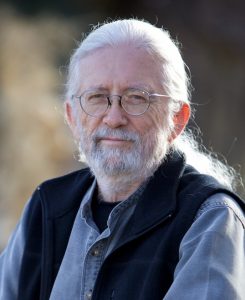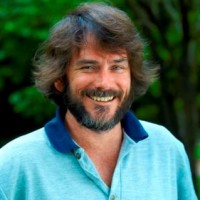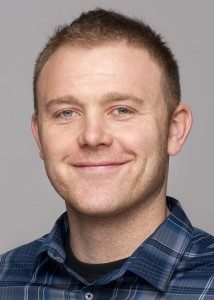Your Food, Coral, and Free Portland
Welcome to Radio Ecoshock. We have 3 interviews for you. Michael Brownlee: local foods as a climate lifeboat. Andrew Baird, hot new science on coral’s last stand. Nick Caleb: Yes, Portland is still standing against ending the world. Let’s get talking. Radio Ecoshock 180110
Listen to or download this Radio Ecoshock show in CD Quality (57 MB) or Lo-Fi (14 MB)
LOCAL FOOD AS A LIFEBOAT FOR DIFFICULT TIMES AHEAD: MICHAEL BROWNLEE
“Our food system is breaking us. Participating in it disconnects us from living systems and from each other, unintentionally producing broken economies, broken communities, and broken people.”
– Michael Brownlee
We have to be suspicious of our food. Who knows what’s on it, or where it came from? Not to mention the insane carbon miles of flying “fresh” food half way around the world to the supermarket.
That’s no way to live, and there are food revolutionaries out there. Michael Brownlee has been in this good food fight for years. In 2011, I interviewed Michael about the Transition Movement. In 2016, we talked about his book “The Local Food Revolution: How Humanity Will Feed Itself in Uncertain Times”. [Nov, 02, 2016]
Now Michael is back. He’s got a new book, linked up with online videos and a training course. The book is “Reclaiming the Future – How to lead the Local Food Revolution in Your Community”.
Listen to or download this 37 minute feature interview with Michael Brownlee, in CD Quality or Lo-Fi
How important is this? Describing his book, Michael writes:
“STEALING OUR FUTURE
I’ll make the case that the global industrial food system – the largest and most destructive industry in the world – has stolen our food supply, has stolen our health and well-being, has degraded our biosphere, has stolen our freedom, has stolen our wealth, has stolen our democracy, and is stealing our future right before our eyes.
I’ll make the case that highly localized regional foodsheds can be humanity’s lifeboat through the stormy seas of an uncertain future to an epoch of restoration and regeneration, and that there is no other structure or strategy that can do this.
This next five to ten years is the most crucial moment in all of human history. This is the pivot point. If we are successful, perhaps no one will remember what we are about to do. If we are not successful, perhaps there will be no one left to remember.”

Author and food activist Michael Brownlee
Canadian cities are getting more local food, partly thanks to the book “The 100-Mile Diet” by Alisa Smith and James MacKinnon. It’s common for restaurants to feature their local food now, and farmer’s markets can look about as busy as supermarkets these days. So there is some progress.
Meanwhile with every generation that passes, there is less knowledge of how to grow real food. When the Great Depression hit, people still have farm families to return to, as many people in Asian cities still have. But in just a couple more generations, there may be very few left who know how to grow outside of agribusiness.
You and I both know there is a deep longing to eat real, safe food that doesn’t bust the world’s carbon budget. The trouble is it takes at least 5 years to get our own good soil going, learn how to handle pests and bad weather, all of it. So there is a lag time, and yet it’s possible this knowledge could be needed overnight. How can we handle that?
As a climate reporter, it seems pretty plain that extreme weather is already harming food production in many parts of the world, including the recent years-long California drought. Is it possible that climate change may push more demand for local production?
CORAL BLEACHING EVENTS ARE COMING FASTER AND FASTER, NEW SCIENCE WARNS – LEAD AUTHOR DR. ANDREW BAIRD
In June of 2016, we talked with the grandfather of coral science, Charles Veron. Charlie has just returned from an aerial survey of the Great Barrier Reef. He was very glum.
Time to save the world’s coral reefs is rapidly running out! That’s the word from new science out of Australia. If the nurseries of the seas go extinct, this could be the largest single biological loss due to climate warming. Everything changes.
The paper is “Spatial and temporal patterns of mass bleaching of corals in the Anthropocene.” It’s just come out in the prestigious journal Science. The lead author is Terry P. Hughes. Our guest is co-author Dr. Andrew H. Baird from James Cook University, in Queensland Australia, right on the Great Barrier Reef.
Andrew Baird is the Professorial Research Fellow and Chief Investigator at the Australian Research Council Centre Of Excellence In Coral Reef Studies. He’s published over 140 peer-reviewed articles, many in top world science journals. In addition to training new PhD candidates, Andrew is also a science communicator, writing popular articles in the New York Times, the Jakarta Post and in Australia’s lively science blog “The Conversation.”

Dr. Andrew Baird
Here is a sentence from your ARC Centre press release, that really scares me, quote:
“The researchers show that tropical sea temperatures are warmer today during cooler than average La Niña conditions, than they were 40 years ago during El Niño periods.”
I think loss of coral would be a geophysical event beyond the imagination.
You can find a good article about all this here, and an interactive map of coral bleaching here.
FOSSIL FREE PORT IN PORTLAND – LEGAL WIN WITH NICHOLAS CALEB
No matter how green local voters, multinational companies have repeatedly tried to use Portland Oregon as a base to export more fossil fuels, and more greenhouse gases. Companies tried a coal export terminal, and then a dangerous propane loading facility. In December 2016, Portland said “No” with a new bylaw called the “Fossil Fuel Terminal Zoning Amendments”. That was shot down by another government body, but last week Appeals Courts gave some climate-fighting power back to the people of Portland. It’s a win and a test case for a lot of cities.
Let’s get the goods from Nicholas Caleb. He’s the staff Attorney at the Center for Sustainable Economy, one of a half dozen non-profits including environmentalists, lawyers, an doctors – who fought for this right.

Lawyer Nick Caleb
Since the U.S. National Government is abdicating it’s responsibility to protect citizens from things like climate-induced drought, forest fires, and extreme storms, the role of city governments and strong green mayors are rising.
The coal port denied in the Pacific Northwest moved to Vancouver, Canada. The Vancouver government objected, but higher levels of government controlled the Port and built a new coal export facility. The big corporations found a jurisdiction with less local democracy. How can we prevent the migration of such projects to other locations?
Here is a bit from the press release from a half dozen non-profit activist groups, including Oregon Physicians for Social Responsibility, Portland Audubon Society, Columbia Riverkeeper, and Center for Sustainable Economy are represented in this case by Crag Law Center.
“January 4, 2017 (Salem, OR)—Today, the Oregon Court of Appeals reversed, in large part, a Land Use Board of Appeals (LUBA) decision that invalidated Portland’s landmark Fossil Fuel Terminal Zoning Amendments, passed unanimously in December 2016. The Court ruled that Portland did not violate the Dormant Commerce Clause of the U.S. Constitution. The Court’s decision opens the door for local governments to continue to take meaningful action to combat climate change.
Last August, the Portland City Council unanimously voted to appeal LUBA’s decision, which stuck down the city’s ordinance. A coalition of organizations represented by the Crag Law Center, including Oregon Physicians for Social Responsibility, Center for Sustainable Economy, Columbia Riverkeeper, and Audubon Society of Portland, intervened to support the city’s defense of the fossil fuel ordinance.
The Court of Appeals also reversed LUBA’s ruling that the ordinance violated Statewide Planning Goal 12, which governs transportation planning. The Court concluded that the ordinance does not impact transportation facilities or the flow of goods and services in the local and regional economy. The Court sustained LUBA’s ruling that Portland violated Goal 2 of Oregon’s statewide planning goals. The City of Portland can cure this defect through additional procedure and reinstate the Fossil Fuel Terminal Zoning Amendments.
“We’re thrilled. Today’s decision affirms that Portland and other communities can implement innovative protections to counter threats to human health and safety from dangerous fossil fuel infrastructure, ” stated Regna Merritt of Oregon Physicians for Social Responsibility.”
=====================
Wow, that’s all we can squeeze in next week. Next time we’ll ask the experts why many of you are so freezing cold, and maybe a few other things. Love to all – Alex.
If North America is having a bad winter again this year, it’s because the jet stream got stuck again. Here in Europe, we’re having an unusually mild winter, even more so than the last few, and for basically the same reason. Where I live (near Berlin), we’re just at the edge between the maritime climate zone (warmed by the Gulf stream) and the continental climate zone (i.e. Russian cold). As long as the pressure areas suck in air from the west, it hardly freezes at all, and this year, the system seems to be stuck on that setting. Normally (that is, normally in the last 20-30 years), we have a couple of days of light snow and occasional night frost in November and early December, then up to 15°C over Christmas. I’ve seen snow on Christmas maybe once in my life. But then the winter finally arrives for real on or just after New Year’s, to stay with deep night freezes (i.e. 5 to 20°C below zero) and frequent day frost until at least late February, so that the soil stays frozen solid until March, even though we generally don’t get much snow.
This year, we’ve only had a little snow once so far (a month later than we normally get the first snow), the Silvester night featured a balmy 12°C at midnight, and since then, there still has only been one single night of serious frost, but that brief incursion of eastern/northern airflows has already been cancelled again, and temperatures are staying slightly above freezing again this week. (Which is helpful for me personally, as I had been too sick to cover up the strawberries and carry my potted plants into the at most only mildly frosty greenhouse, so they don’t die of dehydration once the soil in the pots freezes solid and doesn’t thaw anymore. And it saves some heating costs. But it’s certainly not normal weather for our region. And if there aren’t enough freezing days, fruit and nut trees adapted to our lattitude won’t develop blossoms next spring, and insect pests don’t die in large enough numbers.)
The local meterologists say that when the deep freeze hasn’t set in by the middle of January, it won’t really come at all this year, because the days are already getting longer again. And because freezing air tends to stay above freezing ground, which is partly the reason you have much colder winters in Canada than we have in Central Europe, even though we are on the same lattitude – there’s much less continuous land mass over here to hold the frosty air, and the sea doesn’t freeze over as fast as the land. I guess this is why so far, when the jet stream slows down or gets stuck, it’s always North America that ends up with the loop pulling down arctic air, while Europe gets the opposite configuration. I mean, just statistically, it should be the other way around occasionally.